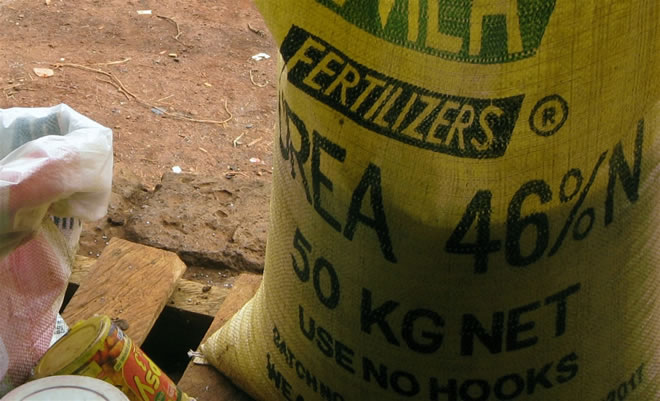

NAIROBI, 18 October 2012 (IRIN) - There is growing need to promote inorganic fertilizer use among smallholders to improve food production and food security, especially among the world’s poorest populations, but its use must be sustainable, experts say.
“Fertilizers are an important component in ensuring that the world can produce enough food to feed its population, but there is need for farmers to be sensitized that it has negative effects, too, like posing a threat to life in lakes and coastal areas,” Joseph Alcamo, chief scientist at the United Nations Environmental Program (UNEP), told IRIN.
Organic fertilizers come from plant or animal matter, while inorganic fertilizers are mineral-based or synthesized. Inorganic fertilizers can leave behind harmful deposits, increase soil acidity or fail to replenish soil nutrients. Blending organic and inorganic fertilizers, experts say, is the most sustainable approach to increasing food productivity while saving the soils crops are grown on.
“While the use of inorganic fertilizers among Africa’s smallholders is till-minimal, promoting a blend with organic fertilizers is more sustainable in conserving the soil and the environment,” Jeremiah Mowo, a scientist at the International Centre for Research in Agroforestry, told IRIN.
In the Abuja Declaration on Fertilizer for an African Green Revolution, African governments pledged to increase the level of fertilizer use from an average of 8kg per hectare, to an average of at least 50kg per hectare by 2015.
But a report by UNEP, the International Fund for Agriculture Development, the World Bank and the World Food Programme has warned against fertilizer overloading and called for sustainable use of fertilizer, among other measures, to avoid famines.
Excess fertilizer use has been known to lead to eutrophication in bodies of water - the excessive growth of algae that deprives other species of enough oxygen - which can create dead zones.
“Over-use of fertilizers in farms, and especially those near water sources, can lead to negative effects on fish and aquatic life, which other segments of the population rely on for their livelihoods,” Alcamo added.
African countries are increasingly issuing subsidies to smallholders to buy farm inputs, which experts say will see an increased use of inorganic fertilizers.
“With subsidies, farmers in Africa are increasingly using fertilizers to improve crop production, but the question has always been the sustainability over time, both in terms of saving the environment and ensuring soil fertility,” Bramwel Gumbe, a soil scientist at the Maseno University in Kenya, told IRIN.
Source: IRIN